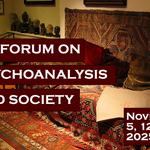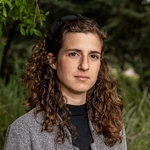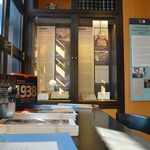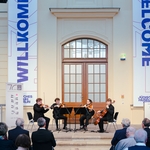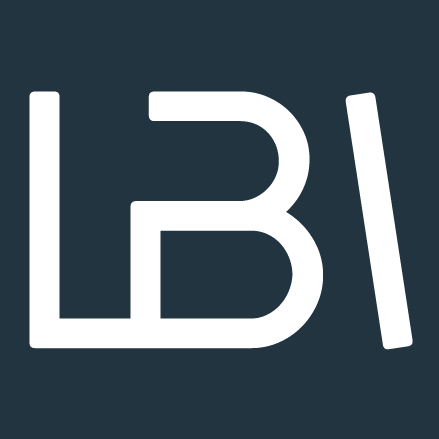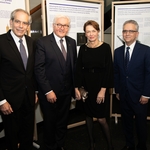Preserving Private Libraries at Leo Baeck Institute


- Author
- Renate Evers
- Date
- Tue, Sep 25, 2018
Thanks to a generous grant of The Cahnman Foundation, the LBI Library is creating virtual inventories of three complete private German-Jewish libraries. With the founding generation of the Leo Baeck Institute almost gone, the LBI is preserving some representative libraries in their entirety to document the cultural phenomenon of private German-Jewish libraries which were transported abroad from Germany, Austria, or other German-speaking areas in the 1930s.
Typical private library collections owned by German Jews have Jewish and non-Jewish books side-by-side and usually include the canon of German classical literature of the 19th century as well as modern writers of the early 20th century. They often include books from previous generations, such as prayer books and family bibles. They also show traces of the path of emigration, including works added in transitional countries or after settling in a new home country.
Research on private libraries as documents of social and cultural history and the investigation of book provenance and ownership has developed into an interesting research field. Private libraries can also be found and studied at institutions such as the German Literature Archive in Marbach, with its large collection of Autorenbibliotheken (the personal libraries of significant writers) and the Moses Mendelssohn Zentrum in Potsdam, which preserves several entire library collections of Jewish owners, such as the Alex Bein Bibliothek, the Ernst A. Simon Bibliothek, and the Ludwig Geiger Bibliothek.
The LBI will create inventories for three libraries: The Library of Judith Marcus Tar and Zoltán Tar, the scholarly collection of two sociologists affiliated with The New School; The Library of Gabriele and Fritz Glueckselig, a literary library; and The Library of Henry (Heinz) Wachs (see opposite page), who was a graphic designer. To the extent possible, the LBI will preserve all these collections in their original order, including annotations, bookmarks, and inserted clippings.
“For the Jewish people the book is the reason, center, and extent of its existence for three thousand years [...],” observed Karl Wolfskehl in his 1926 essay “Die Juden und das Buch.” “Nowhere is the joy about their own libraries so common as among Jews. And many anecdotes reaching back to ancient times tell about how difficult it is for Jews to separate themselves from their beloved reading treasures on their life journeys and journeys of suffering.”
Private libraries reflect not only the reading habits of their owners, but their cultural values and ideals as well. In the case of scholars and authors, libraries can document the intellectual sources of and influences on their works. Book collections show the interdisciplinary context in which the collector lived or wanted to be seen.
Émigré libraries have their own complex meaning, apart from the literary, educational, and aesthetic value of the books in the collection that reflect on the literary taste and education or “Bildung” of their owners. For German-Jewish émigrés, language and literature could become almost synonymous with “Heimat.” A strong memento of a lost world, libraries can connect an uprooted family history and serve as a spiritual, intellectual, and cultural home.
Great émigré book collections like the famous Schocken Library in Jerusalem or the Warburg library in London, contain(ed) a mixture of German classical literature as well as Jewish-themed books. These libraries stand for a culture that existed until 1933 and which came to be referred to by various exiled authors as the “other Germany.”
The library collection of the Leo Baeck Institute was and is to a great extent built with donations of books from private collections. The Institute has always preserved and catalogued the provenance information of donated books, but in most cases only some of the books from a donated private library could be accessioned to avoid duplication. This new initiative, creating inventories of entire libraries, will give the LBI the unique chance to document the organic character of entire private collections.
Latest News
